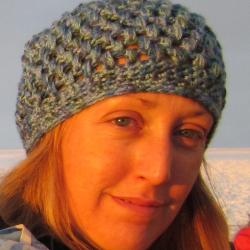Jen Walsh
Jen Walsh is a Research Biologist with the Antarctic Ecosystem Research Division at the Southwest Fisheries Science Center. Her research focuses on the trophic ecology of Antarctic krill. Prior to piloting gliders, she analyzed krill samples obtained from research surveys to study the body condition and trophic position of krill in relation to annual environmental conditions. These days, she analyzes glider data to study the distribution and abundance of krill around the northern Antarctic Peninsula in relation to chlorophyll concentration. When she’s not virtually chasing gliders around the Southern Ocean, she enjoys kayaking and cooking.
Science Blog: Glider Piloting with Jen
Selected Publications:
Walsh, J., and Reiss, C. 2023. Extreme El Niño southern oscillation conditions have contrasting effects on the body condition of five euphausiid species around the northern Antarctic Peninsula during winter. Polar Biology. DOI: https://doi.org/10.1007/s00300-023-03129-5
Reiss, C.S., Cossio, A.M., Cutter, G.R., Walsh, J., and Watters, G.M. 2021. Glider-based estimates of meso-zooplankton biomass: a fisheries case study on Antarctic krill (Euphausia superba) around the northern Antarctic Peninsula. Frontiers in Marine Science. DOI: https://doi.org/10.3389/fmars.2021.604043
Walsh, J., and Reiss, C. 2020. Lipid content and stable isotopes of zooplankton during five winters around the northern Antarctic Peninsula. Scientific Data 7: 380. DOI: https://doi.org/10.1038/s41597-020-00722-9.
Walsh, J., Reiss, C.S., and Watters, G.M. 2020. Flexibility in Antarctic Krill Euphausia superba decouples diet and recruitment from overwinter sea-ice conditions in the northern Antarctic Peninsula. Marine Ecology Progress Series 642: 1 – 19. DOI: https://doi.org/10.3354/meps13325.
Bernard, K., Gunther, L., Mahaffey, S., Qualls, K., Sugla, M., Saenz, B., Cossio, A., Walsh, J., and Reiss, C. 2018. The contribution of ice algae to the winter energy budget of juvenile Antarctic krill in years with contrasting sea ice conditions. ICES Journal of Marine Science. DOI: https://doi.org/10.1093/icesjms/fsy145.
Reiss, C.S., Cossio, A.M., Santora, J.A., Dietrich, K.S., Murray, A., Mitchell, G., Walsh, J., Weiss, E.L., Gimpel. C., Jones, C.D., and Watters, G.M. 2017. Overwinter habitat selection by Antarctic krill under varying sea-ice conditions: implications for top predators and fishery management. Marine Ecology Progress Series 568: 1 – 16. DOI: https://doi.org/10.3354/meps12099.
Reiss, C.S., Walsh, J., and Goebel, M.E. 2015. Winter preconditioning determines feeding ecology of Euphausia superba in the Antarctic Peninsula. Marine Ecology Progress Series 519: 89 – 101. DOI: https://doi.org/10.3354/meps11082
